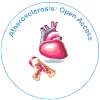当社グループは 3,000 以上の世界的なカンファレンスシリーズ 米国、ヨーロッパ、世界中で毎年イベントが開催されます。 1,000 のより科学的な学会からの支援を受けたアジア および 700 以上の オープン アクセスを発行ジャーナルには 50,000 人以上の著名人が掲載されており、科学者が編集委員として名高い
。オープンアクセスジャーナルはより多くの読者と引用を獲得
700 ジャーナル と 15,000,000 人の読者 各ジャーナルは 25,000 人以上の読者を獲得
インデックス付き
- Google スカラー
- レフシーク
- ハムダード大学
- エブスコ アリゾナ州
- パブロン
- ICMJE
役立つリンク
オープンアクセスジャーナル
このページをシェアする
抽象的な
Peroxisome Proliferator-Activated Receptor Activators Target Human Endothelial Cells to Inhibit Leukocyte-Endothelial Cell Interaction
Simon Jackson, Farhad Parhami, Xiao-Ping Xi, Judith Berliner, Willa Hsueh, Ronald Law, Linda Demer
An early event in acute and chronic inflammation and associated diseases such as atherosclerosis and rheumatoid arthritis is the induced expression of specific adhesion molecules on the surface of endothelial cells (ECs), which subsequently bind leukocytes. Peroxisome proliferator-activated receptors (PPARs), members of the nuclear receptor superfamily of transcription factors, are activated by fatty acid metabolites, peroxisome proliferators, and thiazolidinediones and are now recognized as important mediators in the inflammatory response. Whether PPAR activators influence the inflammatory responses of ECs is unknown. We show that the PPAR activators 15-deoxy- Δ12,14-prostaglandin J2 (15d-PGJ2), Wyeth 14643, ciglitazone, and troglitazone, but not BRL 49653, partially inhibit the induced expression of vascular cell adhesion molecule-1 (VCAM-1), as measured by ELISA, and monocyte binding to human aortic endothelial cells (HAECs) activated by phorbol 12-myristate 13-acetate (PMA) or lipopolysaccharide. The “natural” PPAR activator 15d-PGJ2 had the greatest potency and was the only tested molecule capable of partially inhibiting the induced expression of E-selectin and neutrophil-like HL60 cell binding to PMA-activated HAECs. Intracellular adhesion molecule-1 induction by PMA was unaffected by any of the molecules tested. Both PPAR-α and PPAR-γ mRNAs were detected in HAECs by using reverse transcription-polymerase chain reaction and a ribonuclease protection assay; however, we have yet to determine which, if any, of the PPARs are mediating this process. These results suggest that certain PPAR activators may help limit chronic inflammation mediated by VCAM-1 and monocytes without affecting acute inflammation mediated by E-selectin and neutrophil binding.

 English
English  Spanish
Spanish  Chinese
Chinese  Russian
Russian  German
German  French
French  Portuguese
Portuguese  Hindi
Hindi